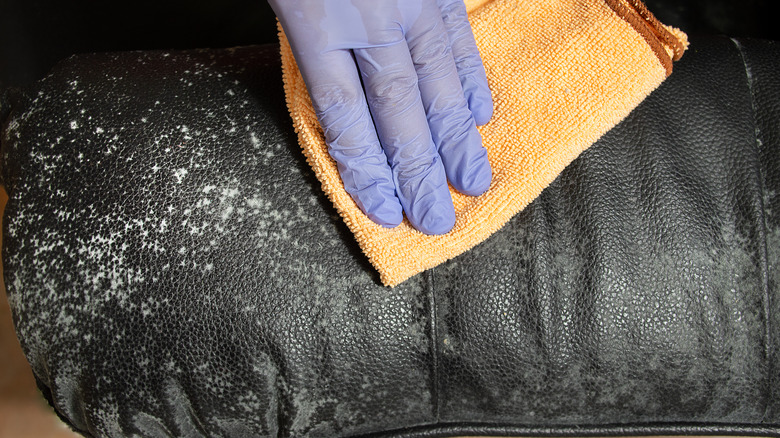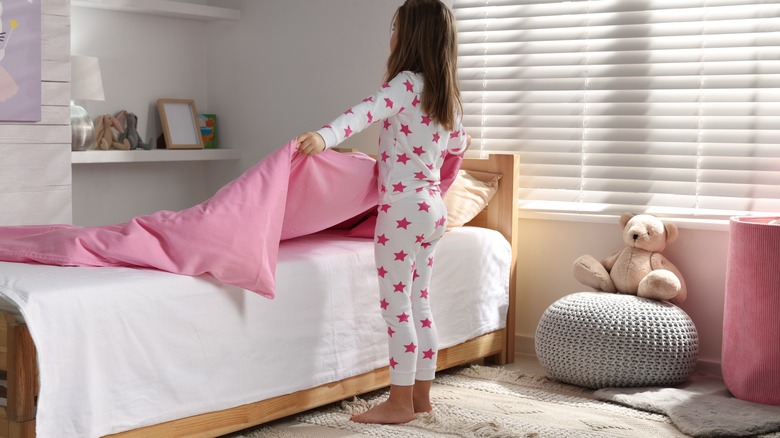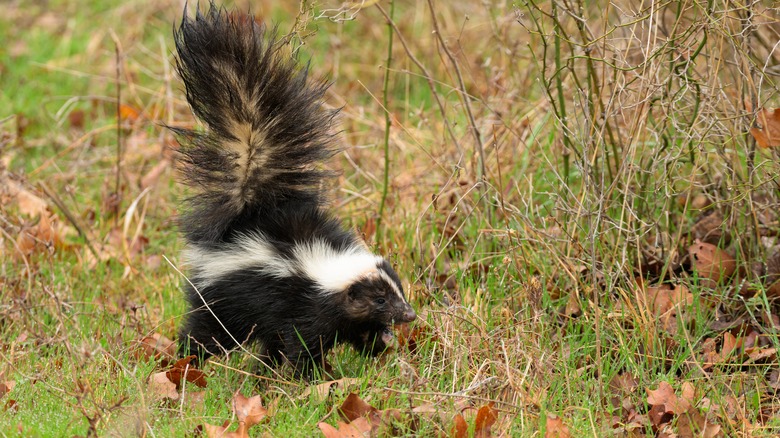7 Foul Smells That Vinegar Can Remove From Your Laundry
Getting laundry to smell fresh again after a bad accident is essential; using vinegar is the first step to making that happen. Whether you got sprayed by a skunk while wearing your favorite jeans, your workout clothes smell like they have grown a small mushroom farm, or your kitchen apron still smells like smoke from a burned dish weeks ago — white vinegar is here to save the day. In this House Digest exclusive, we spoke with a home cleaning expert about the ins and outs of just what vinegar can do when it comes to removing foul smells.
A small caveat: while there are many different kinds of vinegar, we are specifically talking about distilled white vinegar for these hacks. If you don't like the smell of vinegar, don't worry — there are also plenty of ways to mask the smell of vinegar when cleaning, like using essential oils or giving the items an extra rinse. Now, grab your nearest bottle, and prepare to get your stinkiest clothes smelling brand new again.
1. It gets rid of the odor of cigarette smoke
Smoke can be one of the hardest smells to get out of clothing, but it is also one of the easiest odors to pick up. You'll notice after a fireworks show, bonfire, or even an hour or two in a place with cigarette smokers — you reek of the fumes. Luckily, there's a good solution. "Vinegar contains acetic acid, which neutralizes alkaline odors like those from cigarette smoke," Deepak Shukla, founder of Pearl Lemon Cleaning, tells House Digest in an exclusive interview. "The acid breaks down the smoke molecules, removing the lingering smell."
Methods for removing smoke from laundry can work on other textiles like your couch and are luckily pretty straightforward, too. "Mix equal parts of white vinegar and water in a spray bottle," Shukla recommends. "Lightly mist the air and fabric surfaces where the smoke odor is present." It works like a DIY, chemical-free version of Febreze. Yet, this method won't work for everything. For some smells, you need a different approach. "For more severe odors, leave bowls of vinegar in the affected areas overnight to absorb the smell."
2. It vanquishes pet smells
Pets bring so much joy to our homes, but they also bring a lot of bad smells. However, this issue has a straightforward fix — even if you've developed nose blindness. "Vinegar helps to break down the organic compounds found in pet urine, dander, and other smells," Shukla explains. "Its natural acidity neutralizes ammonia-based odors, which are common in pet-related smells."
So, if your dog sleeps on the couch every night or your cat throws up on the carpet, you'll only need a few things to make things start smelling better again. "Combine one cup of white vinegar with two cups of water and a few drops of essential oil (for added fragrance) in a spray bottle," Shukla advises. "Spray the mixture on carpets, upholstery, and pet bedding, then blot with a clean cloth." The best essential oils are a matter of taste, although citrus, eucalyptus, and peppermint are favorites. Yet, this might not always work right away, so Shukla recommends allowing the fabric to soak for a little bit. "For tough pet stains, allow the vinegar solution to sit for 10 minutes before blotting," she shares.
3. It solves the earthy smell of mildew
Whether your home flooded, you forgot to put the damp laundry in the dryer for a week, or you live in Florida where it's excessively humid year round — the earthy smell of mildew is easy to come by, yet challenging to get rid of. "Mildew and musty odors are caused by mold spores, which thrive in damp environments," Shukla says. "However, vinegar's antifungal properties help to kill the mold, preventing further odor production."
To remedy the situation, Shukla recommends a simple recipe. "Fill a spray bottle with undiluted white vinegar. Spray directly on the affected areas, like bathroom tiles or laundry rooms. Allow it to sit for an hour before scrubbing with a brush and rinsing with water," he says. You can also add 1/2 cup of white vinegar to your laundry before the rinse cycle to pull the musty stench from the fabrics. Repeat the rinse cycle afterward if you find that they smell too much like vinegar when you are finished.
4. It remedies cooking odors (garlic, fish, etc.)
While you might be proud of the great dish you whipped up in the kitchen, it doesn't mean you want to smell the meal on your apron, dishtowels, and hoodie for the next few weeks. If you have cooked something with a particularly pungent odor, like salmon in a frying pan, vinegar can make things smell great again. This hack works because "the acetic acid in vinegar neutralizes strong cooking odors, breaking down the volatile compounds that cause lingering smells in the kitchen," Shukla says.
The first step to making things right is to "simmer a mixture of one cup of vinegar and one cup of water on the stove for 15-20 minutes to neutralize odors in the air," Shukla says. "Alternatively, place a bowl of vinegar on the counter after cooking to absorb the smells overnight." As before, round up your kitchen textiles and throw them on a wash cycle with vinegar, too, for a quick fix.
5. It conquers the mustiness of intense sweat
The worst part of being on a fitness kick is the sheer amount of sweaty laundry you generate. Not only that, but it often smells so bad that it's nearly impossible to get the post-workout stench out of your clothing without a lot of effort. Well, not anymore — because now you know you can use vinegar. "Soak [the garment] in a white vinegar solution before washing," Jill Spradlin, a Health and Fitness Instructor at Community Care College, shared on the school's blog. "White vinegar is a miracle ingredient when getting rid of odors. Soak your clothes in a sink with one cup of white vinegar and some cold water. Leave them for about 15 to 30 minutes, then clean in the washing machine."
This pre-washing ritual gives the vinegar enough time to soak through the sweat-stained clothing and penetrate the smells. If your clothes are stained — whether browned by sweat or rings of intense salt — you can also use vinegar to get them out. First, try rubbing them with a bar of hand soap to clean them. Then, to fix discoloration, use ammonia on a wet perspiration stain and white vinegar on an older one. To rinse, wash the clothes in the hottest water possible.
6. It removes the stink of bodily waste
Bodily fluids smell bad. There is simply no way around this. It's an unfortunate fact of life, and no place is safe from these dreadful accidents. Your child wet the bed. Your partner threw up on the couch. Your pet had an accident on the carpet when you were gone too long. Whether you are washing your bedding, disposable diapers, or your favorite pair of pants — vinegar is a great place to start.
When using it on cotton or linen fabrics, be sure to water down the mixture just a touch. The best mix is ⅔ cup of water to ⅓ cup of vinegar. However, before you do this, remove and rinse out as much of the mess as possible. Blot it up, scrape it off, etc. Then, douse the odorous area in the white vinegar solution. Let it sit on it for at least ten minutes so the vinegar can soak up the smell. Blot it dry, rinse it with water — and repeat as necessary. For more pungent odors, use a solution of 1 tablespoon of household ammonia, 1/2 a teaspoon of liquid dishwashing detergent, and 1 cup of warm water.
7. It lessens the shock of a skunk spray
Having a skunk get into your home or getting sprayed by one doesn't have to be a life sentence. Instead, it's easier than ever to get rid of the putrid scent these furry little creatures release in their defense. While tomato juice is the classic removal option for pets, using white vinegar and water in a spray is what you should use on clothing. This will help you get rid of the smell of skunk spray in no time.
To start, mix 1/3 cup vinegar and 2/3 cup warm water in a spray bottle. Heavily douse the impacted area of your clothing with the mixture and let it sit for about ten minutes. Then, rinse it off. If it's not completely stink-free, you might need to repeat the process with a professional-grade odor-removing solution or bleach. However, never mix vinegar with a store-bought solution to avoid creating a poisonous gas that could kill you if you inhale enough of it.







